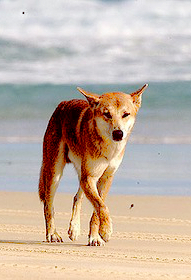Dingo DNA shows low mixing
 Australian researchers have shown that modern dingoes share almost no ancestry with domestic dogs.
Australian researchers have shown that modern dingoes share almost no ancestry with domestic dogs.
A new study takes a deep dive into DNA from fossilised dingo remains, which were dated up to 2,746 years old, compared with the DNA of contemporary dingoes.
Researchers from Queensland University of Technology (QUT) and the University of Adelaide co-led the study, which generated a collection of 42 ancient dingo specimens, dating from 400 to 2,746 years ago.
The DNA from these specimens was then compared with modern dingoes and both ancient and modern dogs worldwide.
The findings revealed that K’gari dingoes have no domestic dog ancestry and are pure dingoes.
Dr Sally Wasef, a paleogeneticist from QUT’s School of Biomedical Sciences and co-lead author of the study, has explained the significance of these findings.
“This dataset gave a rare glimpse into the pre-colonial genetic landscape of dingoes, free from any mixing with modern dog breeds,” she said.
Dr Wasef said the study shows that modern dingoes are behaviourally, genetically, and anatomically distinct from domestic dogs.
The study also highlighted that dingoes' population structure existed thousands of years before European colonisation and interventions such as the dingo-proof fence.
“Our findings show that dingoes’ population structure was already in place thousands of years ago and clarify the genetic heritage of dingoes, while highlighting the importance of using ancient DNA for wildlife conservation,” Dr Wasef said.
The research also indicated that dingoes' ancestors likely arrived in Australia over 3,000 years ago, possibly transported by seafaring people, and certainly well before European settlement.
The study says there are regional distinctions within dingo populations, split roughly along the Great Dividing Range.
Furthermore, the study found that there is less interbreeding between dingoes and modern dogs than previously believed.
“Our research confirms today's dingoes retain much of their ancestral genetic diversity,” Dr Souilmi stated.
The finding adds new details to the cultural importance of dingoes to Aboriginal and Torres Strait Islander peoples and their crucial role in the Australian ecosystem.
The research, published in the Proceedings of the National Academy of Sciences (PNAS), emphasises the need for conservation efforts, particularly for the K’gari dingoes, which do not have any domestic dog ancestry.
The findings also add to concerns about the culling of dingoes due to their interactions with humans, which threatens their small population size.
“Dingoes are currently under threat from lethal culling programs, and our research highlights the importance of protecting populations in national parks and beyond,” Dr Souilmi said.








 Print
Print